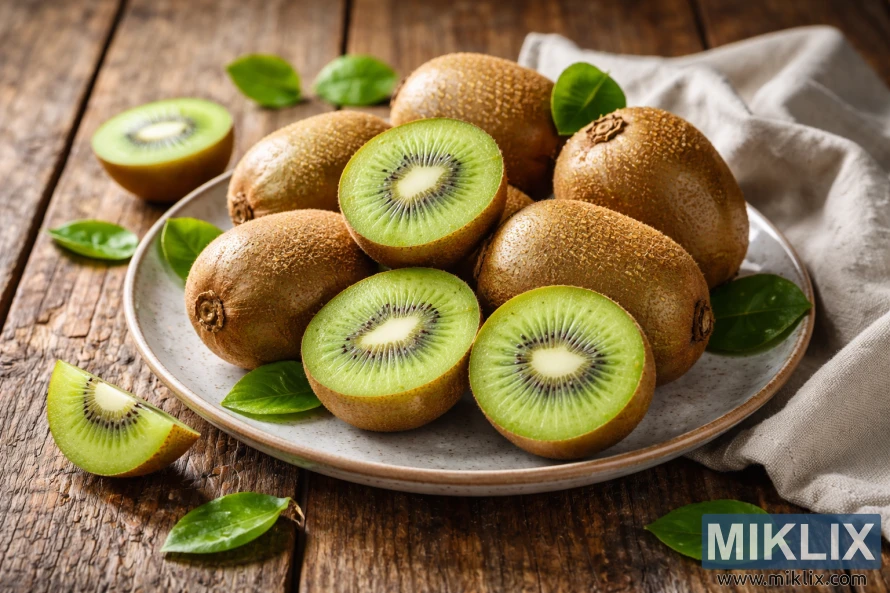Kiwis Uncovered: The Small Fruit with Superpowered Benefits
Published: May 20, 2025 at 12:03:37 PM UTC
Last updated: December 24, 2025 at 11:42:32 AM UTC
Kiwis, also known as kiwifruit, are more than just a tasty snack. They are small, packed with nutrients, and offer many health benefits. These berries are full of vitamins and antioxidants, making them great for your diet. They help boost your immunity, support heart health, and aid digestion. Let's explore the nutritional profile of kiwis and how they can improve your lifestyle.

Key Takeaways
- Kiwis are nutrient-dense and offer various health benefits.
- These fruits are known for their immunity-boosting properties.
- Kiwifruit can contribute to better heart health.
- They support digestive health due to their fiber content.
- Kiwis are rich in vitamins and antioxidants.
- Incorporating kiwis into your diet can enhance overall wellness.
What are Kiwis?
Kiwis, also known as Actinidia deliciosa, come from eastern China. Now, they grow in places like New Zealand and the United States. These fruits are oval, about the size of a chicken egg, and have fuzzy brown skin.
The inside of kiwis can be green or golden yellow. They have small black seeds. Kiwis are sweet and a bit tart, great for many dishes.
There are different types of kiwis, like green and gold. These choices let people pick what they like best. Knowing about kiwis' botanical classification helps us see their unique traits and health benefits.
Nutritional Profile of Kiwis
Kiwis have a great nutritional profile, making them a top fruit choice. A 3.5-ounce (100-gram) serving has about 64 calories and 14 grams of carbs. They also have 3 grams of dietary fiber, which is good for your digestive health.
This fruit is packed with important vitamins like vitamin C, which is 83% of the Daily Value. Kiwis also have vitamin E and vitamin K, which are key for health. They are a good source of potassium and copper, important for the body.
Kiwis are low in calories but high in nutrients. They have vitamins, minerals, and fiber. This makes them a great choice for a balanced diet.
Immunity Boosting Properties of Kiwis
Kiwis are known for their high vitamin C content. This vitamin is key for making white blood cells, which fight off infections. Kiwis have more vitamin C than oranges, making them great for boosting immunity.
Kiwis also have lots of antioxidants. These help protect cells from damage, reduce inflammation, and improve health. Eating foods high in antioxidants can make your immune system stronger, helping you fight off sickness.
Eating kiwis regularly gives you important nutrients and health benefits. Adding these fruits to your diet can help keep you healthy. So, when you need a healthy snack, try a kiwi to boost your immunity.
Heart Health Benefits of Kiwis
Kiwis are great for your heart, making them a smart choice for your meals. They help lower blood pressure and improve cholesterol levels. Eating kiwis regularly can greatly reduce the risk of heart disease.
The fiber in kiwis is key to keeping blood vessels healthy. It helps control cholesterol, which is good for your heart. Kiwis also have antioxidants that protect your heart from damage caused by oxidative stress.

Adding kiwis to your diet can help lower blood pressure. They're not only tasty but also boost your heart's health. Eating kiwis regularly can lead to lasting benefits for your heart.
Digestive Health Support from Kiwis
Kiwis are packed with health benefits, focusing on digestive health. They are full of both soluble and insoluble dietary fiber. This makes them key in keeping our guts working right.
Eating kiwis can help with constipation. Their fiber softens stool and helps with regular bowel movements. This is good for our gut health and can lessen bloating discomfort.
Studies show that kiwis make stool more consistent. They are great for anyone wanting to improve their digestive health. Plus, they help keep our gut microbiome healthy, which is vital for good digestion.
High Vitamin C Content in Kiwis
Kiwis are known for their high vitamin C levels. They offer up to 230% of the daily recommended amount in just one fruit. This vitamin is key in boosting immune health, making kiwis a great choice for staying well.
Kiwis are also packed with antioxidants. These help keep the immune system strong and support healthy skin by promoting collagen. They also help the body absorb iron better, which boosts energy and vitality. Adding kiwis to your meals is a tasty way to up your antioxidant game.
Potential Risks of Eating Kiwis
Kiwis are good for many diets, but they can be risky for some. Kiwi allergies can cause different allergic reactions. These symptoms can be mild or severe, affecting anyone sensitive to the fruit.
Those with kiwi allergies might face these side effects:
- Itching or swelling in the mouth or throat
- Skin reactions such as hives or rashes
- Nasal symptoms, including sneezing and runny nose
- Gastrointestinal issues like nausea, vomiting, or abdominal pain
- In rare cases, difficulty breathing or anaphylaxis
If you know you're allergic to kiwis, be careful. Always talk to a healthcare professional before trying new foods. This is very important if you have allergy concerns.
How Kiwis Promote Ocular Health
Kiwis are packed with nutrients that are great for your eyes. They have lots of carotenoids like lutein and zeaxanthin. These help keep your eyes healthy by blocking harmful blue light and fighting off damage.
Eating kiwis can help prevent eye problems as you get older. A diet full of carotenoids, along with other fruits and veggies, boosts your vision. Kiwis are not just good for your eyes; they also help keep them healthy for a long time.

Including Kiwis in Your Diet
Kiwis are a great choice for a healthy diet. They offer many ways to add nutrition to your meals. Enjoy them raw for a burst of flavor and health benefits.
Try cutting them into slices for a fruit salad. This adds a unique taste and makes your meal look good too.
Blending kiwis into smoothies is another tasty option. They mix well with spinach, bananas, and yogurt for a nutritious start. You can also add them to grilled chicken salads for a fun twist.
Kiwis are also perfect for desserts. Dice them for a fruit tart or use them in salsas to spice up your meals. Their versatility makes them a favorite for meal variety.
With so many ways to use them, kiwis are easy to add to any diet. They bring important nutrients and flavor to your meals.
Kiwis and Their Antioxidant Properties
Kiwis are a powerhouse of antioxidants, thanks to vitamins C and E. These antioxidants fight off free radicals, harmful molecules that can stress cells. Eating kiwis boosts your body's defense and helps you stay healthy.
Antioxidants in kiwis are key in lowering disease risks. They help cells work better and fight off damage. Kiwis are a great choice for anyone looking to eat better and feel better.
Potential Benefits for Asthma Patients
Vitamin C and respiratory health have a strong connection, which is good news for asthma patients. Studies show that eating more vitamin C can make asthma symptoms less severe. This is very true for kids who often wheeze.
Kiwis are packed with vitamin C, making them a great choice for asthma management.
Eating kiwis can help in several ways:
- It can reduce how often you wheeze.
- It can make breathing easier.
- It can also strengthen your immune system, which helps fight off infections.
By adding kiwis to your diet, you can improve your respiratory health. This fruit not only tastes good but also offers health benefits that boost your overall wellbeing.
How Kiwis Contribute to Bone Health
Kiwis are key for bone health because they're packed with vitamin K. This vitamin helps your body absorb calcium, which is essential for strong bones. Eating kiwis can help you get enough vitamin K, making your bones stronger.
Kiwis also have calcium, though not as much as other foods. Eating kiwis often can help prevent osteoporosis and other bone problems. A diet rich in kiwis is a smart way to keep your bones healthy.

A Unique Overview of Kiwis' Origin
The kiwi, a fruit loved worldwide, has a fascinating history. It comes from China's mountainous areas. This fruit is linked to ancient farming practices, showing a rich historical background.
Later, kiwis traveled to New Zealand. There, they were grown and named after the kiwi bird. This bird is a symbol of New Zealand.
New Zealand was key in making kiwis a hit. Farmers there worked hard to make the fruit sweeter and softer. This effort made kiwis popular everywhere.
As kiwis became more popular, they showed how farming spreads across the globe. Today, they're not just tasty but also a sign of cultural sharing and progress. Knowing where kiwis come from helps us see the story behind our food.
How to Select and Store Kiwis
Choosing the right kiwi is important. Look for fruits with smooth, unblemished skin. Any blemishes can mean the kiwi is old or damaged.
To check if a kiwi is ripe, gently press it. A ripe kiwi will feel soft but not mushy. This means it's ready to eat.
Proper storage is key to keeping kiwis fresh. Store unripe kiwis at room temperature until they're ready. Once they're ripe, put them in the fridge to keep them fresh for days.
By following these tips, you can enjoy kiwis at their best. They'll be perfectly ripe and ready to eat.
Fun Facts About Kiwis
Kiwis are often overlooked because of their small size. But they have many fascinating traits that make them special. Here are some cool kiwi facts that show their unique qualities:
- Kiwis are classified as a type of berry, showing they are truly fruity.
- These fruits have more vitamin C than two whole oranges, making them very nutritious.
- The kiwi's name change from Chinese gooseberry to its current name shows its global popularity, mainly in New Zealand.
- Kiwis are full of antioxidants, which help keep us healthy.
It's important to know about kiwis' rich history and health benefits. They add flavor and nutrition to our diets. Adding kiwis to our meals can bring many benefits for our health.
Conclusion
Kiwis are more than just a tasty fruit. They are packed with nutrients that offer many health benefits. They help boost your immune system and improve heart and digestive health. Adding kiwis to your diet is a great way to follow healthy eating habits.
Kiwis have a rich nutritional profile that makes them great for any meal or snack. They are full of vitamin C and antioxidants, which are good for your overall health. Eating kiwis is a simple way to boost your nutrition and energy.
Adding kiwis to your daily meals is a smart choice. You get to enjoy their refreshing taste while also taking care of your health. Kiwis can easily become a part of a healthy and balanced lifestyle.

Further Reading
If you enjoyed this post, you may also like these suggestions:
- Small Fruit, Big Impact: The Power of Apricots for Your Health
- From Brain Fog to Heart Health: The Science-Backed Payoffs of Taking Fish Oil Daily
- From Potassium to Prebiotics: The Banana's Hidden Health Boosters
